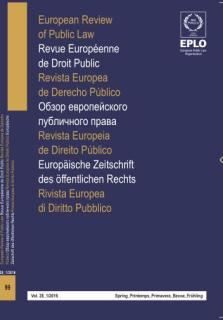
THE POWERS OF THE UNION IN THE EUROPEAN ECONOMIC GOVERNANCE:
NEW TRANSFERS OF SOVEREIGNTY
WERNER MENG
Prof. Dr., Saarbrücken/Mainz (D), Athens (GR)
In the middle of a deep and perhaps existential crisis of the European Union, there is a major concern among the Member States and particularly within the Union itself, that the survival of the monetary union is dependent on the further development of unitary structures, which means: more integration. The last major prospective plan in this respect is contained in the "Report of the five presidents of the Union", that was issued in June 2015 on "Europe's Economic and Monetary Union". It deals with further developments in the economic, financial, fiscal and political Union. The present report looks at the constitutional questions of this plan. Unfortunately, the legal prerequisites are not being dealt with therein in sufficient clarity. Since the plan contains some considerable steps for further inte-gration, at least as concerns the second step, it is indispensable that the constitutional questions, and particularly the powers of the Union, are thoroughly evaluated. This is even more necessary, since the constitutional control of any further steps of integration in the Member States has been tightened given the jurisprudence of some constitutional courts. The present report tries to highlight some pivotal questions that have to be answered before such a plan can really being driven forward.
Au cœur de la crise profonde et peut-être existentielle que vit l'Union européenne se trouve une préoccupation majeure chez les Etats membres et qui concerne en particulier l'Union elle-même, à savoir que la survivance de l'union monétaire dépend de la poursuite du développement de certaines structures unitaires, ce qui signifie: plus d'intégration. Le dernier plan prospectif majeur à cet égard se trouve dans le rapport des cinq présidents de l'Union publié en juin 2015 sur "l'union économique et monétaire européenne". Il traite des développements futurs en matière d'union économique, financière, fiscale et politique. Le présent rapport se penche sur les questions d'ordre constitutionnel contenues dans ce plan. Malheureusement, les conditions légales n'y sont pas traitées avec suffisamment de clarté. Puisque le plan, du moins en ce qui concerne la deuxième étape, contient certaines mesures importantes pour une meilleure intégration, il est indispensable que les questions constitutionnelles et en particulier les pouvoirs de l'Union soient évalués de manière approfondie. Cela est d'autant plus nécessaire que le contrôle constitutionnel des étapes futures de l'intégration dans les Etats membres a été renforcé, compte tenu de la jurisprudence de certaines cours constitutionnelles. Le présent rapport essaie de mettre en évidence certaines questions cruciales auxquelles il convient de répondre avant qu'un tel plan puisse réellement être mis en œuvre.





















